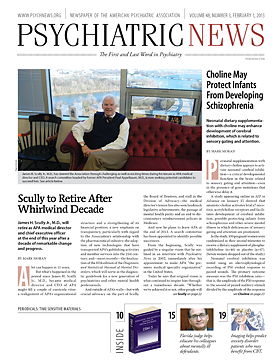There appears to be a large dose-dependent increase in the occurrence of psychotic symptoms during periods of methamphetamine use, according to a study in published online January 9 in JAMA Psychiatry.
Australian researchers found a fivefold increase in the likelihood of psychotic symptoms during periods of methamphetamine use relative to periods of no use. The increase was strongly dose-dependent: individuals who had used methamphetamine 16 or more days in the prior month were significantly more likely to experience psychotic symptoms than those who had used the drug 15 or fewer days.
A total of 278 participants aged 16 or older in Brisbane and Sydney, Australia, who met DSM-IV criteria for methamphetamine dependence but who did not meet DSM-IV criteria for lifetime schizophrenia or mania took part in a longitudinal prospective cohort study consisting of four noncontiguous one-month observation periods. The purpose was to examine the relationship between changes in methamphetamine use and the risk of experiencing psychotic symptoms within individuals over time.
The main outcome measures were clinically significant psychotic symptoms in the past month, defined as a score of 4 or more on any of the Brief Psychiatric Rating Scale items of suspiciousness, hallucinations, or unusual thought content. The number of days of methamphetamine use in the past month was assessed using the Opiate Treatment Index.
Sixty percent of the sample reported psychotic symptoms during at least one of the observed months in the study period. Of those months during which psychotic symptoms were present, 71 percent involved suspiciousness, 35 percent involved unusual thought content (that is, delusions), and 51 percent involved hallucinations.
Psychotic symptoms were more common during periods of methamphetamine use, with a strong dose-response effect between number of days of methamphetamine use and psychotic symptoms. After adjusting for effects of other drug use, the researchers found that methamphetamine use was associated with a fivefold increase in the odds of experiencing psychotic symptoms and that the dose-response effect remained.
“Given the widespread use of methamphetamine globally, greater awareness is needed about the potential effect of this drug on mental health,” the researchers said. “Better evidence is needed on how to manage symptoms of methamphetamine-induced psychosis, and evidence-based treatments for methamphetamine dependence need to be more broadly implemented to curb the high levels of use that induce psychotic symptoms. Although psychotic symptoms appeared to be largely circumscribed to periods of methamphetamine use, the long-term effect of methamphetamine use on a person’s vulnerability to psychosis needs to be better understood.” ■
